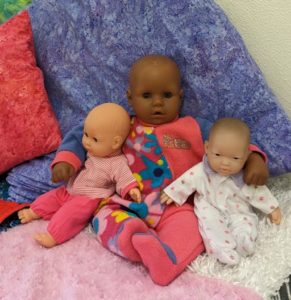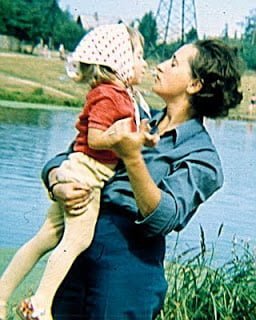We invite you to a unique parenting class – RIE® Parent-Infant Guidance™ class. In this class, parents have the opportunity to learn essential parenting skills: objective observation, selective intervention, and how to nurture independence in their children.
Rita, Olivia, and Chapin have been attending these classes with their parents for a while, and they are comfortable with each other and the familiar environment. Rita and Olivia share a dynamic relationship. Sometimes during class, Olivia would walk to Rita and take an attractive item from Rita’s hands. This is typical behavior for toddlers. A common response might involve telling the child:
- “Olivia, Rita was using the ball. You need to give it back,” or
- “Olivia, we need to share; we can’t grab whatever we want.”
- “It is not nice!!”
In this class, the teachers and parents respond rather than react. The teacher might say, “It looks like Olivia likes that ring too.” She might suggest to Rita, “You can choose to hold onto that ring tightly.” The teacher’s goal here is not to take sides with either child or rescue one of them. The teacher might also say to Olivia, “It looks like Rita really likes this ring. She is holding it tightly.” The teacher is stating what she sees without judgment of either child’s behavior. The teacher will only intervene if the situation changes and is no longer safe, like saying, “This is Rita’s hair. I don’t want you to pull on her hair. You can touch gently.” The teacher might then model how to caress Olivia’s hair.
In this class, parents use a different approach when helping their children through conflict. They seem comfortable and confident, but I wonder if the parents are asking themselves:
- Will this dynamic between the two girls stay the same?
- When will Rita learn to hold on tightly?
- When will Olivia choose to give?
Today Story:
Today, Rita arrived to class first. She went straight to the three dolls sitting on the mat, picked them up, gave them kisses, and carried them with her as she climbed up on the climbing structure. She walked down the slide while still holding the three girls in her hand. Then, she found a blanket to cover one of the dolls.
Chapin and Olivia joined the class, and their moms found a comfortable spot to sit. When the two friends arrived in the classroom, Rita put down 2 of the dolls on the floor while she played with the third doll. Chapin picked up a doll, and Rita came straight to him and retrieved the doll. He didn’t protest.
Olivia picked up one of the dolls from the floor and carried the doll to the pretend kitchen. Rita walked to Olivia and pulled the doll. The two girls struggled for a while, and the doll ended up in Rita’s hand. Olivia landed on her bottom and then lightly banged her head on the floor. Olivia cried and was comforted by her mother.
Rita seemed overwhelmed by the situation and began crying too. After a quick recovery, the two girls exchanged possession of the doll several times. At some point, Olivia held the doll, and Rita made a loud and unhappy sound; she protested!! Her mother pointed out that there were two other dolls available on the floor, but Rita had no interest in those two at that moment. Chapin observed the situation with interest.
Olivia ran with the doll to the shelf and placed the doll on top. As soon as Olivia noticed that Rita was moving in that direction, Olivia picked up the doll. Suddenly, Olivia turned around, walked to Rita, and gave her the doll. Rita gave the doll a big hug. Olivia sat on the ground and began placing balls in a tube. I told Olivia, “It was very thoughtful of you to give this doll to Rita. You noticed that Rita really wanted the doll.”
In conclusion:
To me, it looked like a significant moment of discovery, learning, and empathy. It took more than one class for Rita to become assertive and to persist if she wanted something. Likewise, it took many classes for Olivia to offer a toy to a crying friend. I was wondering what would happen if we as adults intervened in a more traditional way by protecting Rita and Chapin and making Olivia give up the toy. Would Olivia have learned to give, or would she have felt more resentment? Would Rita have felt safer, or would she have felt that she needed an adult to resolve her problem and protect her?
Let me know if you need more information about RIE® Parent-Infant Guidance™ Classes.
Wishing you all the best in this difficult yet exciting journey of parenting!
Warmly,
Teacher Kira







